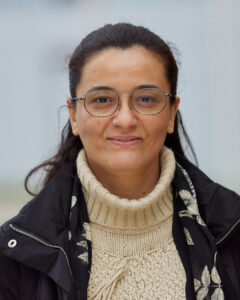Monia El Barbari’s Interview
Starting date: 01.12.2022
Nationality : Moroccan
Implementing Partner : Forschungszentrum Juelich
Main supervisor: Dr. Ulrich Rücker

Few words about you and your research project
Hello everyone! My name is Monia El Barbari, I come from Morocco, a beautiful country in North Africa. Coming here to join Forschungszentrum Jülich as a post-doc fellow, I can say that I am full of proud and expectations.
The main objective of my research project is to develop low dimensional cold moderator systems, which will provide a pathway to upgrade existing instruments in neutron facilities such as MLZ for cold neutron applications and provide critical components in the framework of upcoming accelerator-based neutron sources.
In parallel, we plan to schedule two secondments, the first one at Mirrotron Ltd in Hungary and the second one at ESS in Sweden, both of them are essentials for providing more specific learning about the materials that make up moderators systems and for evaluating the capacity of such systems as well to perform under normal regulations.
What is your background? How have you heard about GNeuS?
In my previous research work, I focused on the study of the physical characteristics of some neutron-moderating materials that can influence neutron parameters in nuclear reactors. This is particularly the case for the interatomic distances in crystals that can affect directly the energies of thermal neutrons, since the wavelengths of these neutrons are of the same magnitude as the interatomic distances link1 and link2.
At the same time, I was the president of the student chapter of the Moroccan Association of Nuclear Engineers at Abdelmalek Essaadi University, so I always kept abreast of all neutron-related events around the world.
This is the reason why I couldn’t miss the GNeuS call posted on euraxess, and I immediately found myself curious about such an interesting project.
Why did you apply specifically on GNeuS?
As I have been working with neutrons for several years now, I now better understand how difficult it can be to overcome the obstacles you may face in this field, especially the lack of sufficient neutron-based facilities in many countries.
However, the GNeuS program offers its fellows the opportunity to work with world-leading facilities under competent and renewed supervisors in the field of neutron sciences. In addition, the program provides a well-structured training program that takes into consideration the needs and main research interests of each fellow individually.
This will undoubtedly have a positive impact on my personal and professional development as well as of my GNeuS colleagues, and it will broaden our horizons to carve new paths and becoming accomplished scientists in this area.
What impacts do you expect from the GNeuS fellowship?
In these two years, I aim to enrich my academic and professional career; it will be a great opportunity and significant advantage to be one of the global neutron scientists in the near future.
But beyond this, I hope I could be able to lead and inspire other women in my home country in reaching their own career goals. I really want to be able to have an impact on the growth of the neutron industry, not only in Morocco but also all over the world.
All these goals are the core of the GNeuS vision for building the next generation of neutron scientists.
